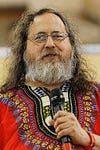Richard Stallman Is Not The Father Of Open Source
Richard Stallman is absolutely certain of many things. One of them is that he is not the father of open source software.


Cloud Vs. On-Premises: 6 Benefits Of Keeping Data Private
Cloud Vs. On-Premises: 6 Benefits Of Keeping Data Private (Click image for larger view and slideshow.)
Richard Stallman wants to make one thing completely clear: He is not the father. "I'm not the father of open source. If I'm the father of open source, it was conceived by artificial insemination without my knowledge or consent," he proclaimed from the keynote stage last month at Fossetcon 2015. It wasn't close to the strongest statement he made from that stage.
When the keynote speaker walks to the podium bare-footed, it's not likely to be a typical business-audience speech. Of course, when the keynote speaker is Richard Stallman, the expectation doesn't tend toward the buttoned-down. Stallman has been preaching the gospel of free software for more than 30 years and his passion for the subject shows no signs of flagging. Free software is good, non-free software is evil, and the line between free and not-free is bright and clear. That is the essence of Stallman's message in 2015.
The bright line in Stallman's software world centers on control. "With any program there are two possibilities: The users control the program or the program controls the user. When the user controls the program, we call that free software," he said. For Stallman, "free" isn't about price but about the lack of restrictions. He has explained it on the web site for the GNU operating system in a motto that has spawned thousands of t-shirts seen at conventions like Fossetcon: "Free software is a matter of liberty, not price. To understand the concept, you should think of free as in free speech, not as in free beer."
The difference in free is stated somewhat more elegantly by those who call for software that is "free as in libris" rather than "free as in gratis." For IT executives who struggle to incorporate "free and open source" software, the difference can be critical -- and that difference is the reason Stallman wants nothing to do with the label "open source."
Stallman pulled no punches when he turned to the subject of open source software. "Another obstacle to free software activists are the open source boosters," he said. "They want to talk about free software without talking about the social implications. They wanted to talk about free software without upsetting business executives. By coining the term 'open source' they were able to change the focus to appeal only to practical convenience arguments," he explained.

(Image: Thesupermat via commons.wikimedia.org)
Two of Stallman's problems with this approach are the ability of someone to wrap open source software in a proprietary package, and open source software's focus on the software alone. Stallman has described free software as an integral part of a free society and free human existence: He feels that too many people are willing to accept a few convenient not-free software components while they feel good about the free (or open source) software they support.
"In order for a collection of software to be free, every piece of software in the collection must be free. A single non-free program renders the collection of programs not free," he said. And he was not afraid to point fingers at software, even if it is popular in the open source community. "Ubuntu is malware because it uses a desktop that spies on users. Even if that is fixed, they still install non-free software as part of the system," Stallman said. "The values of Ubuntu are practical convenience only, not freedom. That approach is not conducive to winning and establishing freedom."
Most IT managers have little interest in bringing politics -- even the politics of software -- into the discussion about which software to buy and deploy. It can be useful, though, to have someone in the conversation who reminds everyone that there's more to software than simple functionality. There are licensing terms beyond the financial and data sharing details that can add risk to applications that seem innocuous. Richard Stallman is eager to point out each of those terms and details, as he's eager to point out that he is the father of free -- not open source -- software.
**New deadline of Dec. 18, 2015** Be a part of the prestigious InformationWeek Elite 100! Time is running out to submit your company's application by Dec. 18, 2015. Go to our 2016 registration page: InformationWeek's Elite 100 list for 2016.
About the Author
You May Also Like






